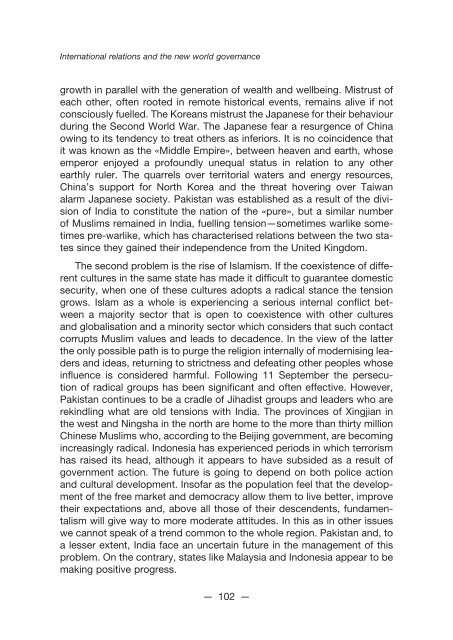Strategic Panorama 2009 - 2010 - IEEE
Strategic Panorama 2009 - 2010 - IEEE
Strategic Panorama 2009 - 2010 - IEEE
Create successful ePaper yourself
Turn your PDF publications into a flip-book with our unique Google optimized e-Paper software.
International relations and the new world governance<br />
growth in parallel with the generation of wealth and wellbeing. Mistrust of<br />
each other, often rooted in remote historical events, remains alive if not<br />
consciously fuelled. The Koreans mistrust the Japanese for their behaviour<br />
during the Second World War. The Japanese fear a resurgence of China<br />
owing to its tendency to treat others as inferiors. It is no coincidence that<br />
it was known as the «Middle Empire», between heaven and earth, whose<br />
emperor enjoyed a profoundly unequal status in relation to any other<br />
earthly ruler. The quarrels over territorial waters and energy resources,<br />
China’s support for North Korea and the threat hovering over Taiwan<br />
alarm Japanese society. Pakistan was established as a result of the division<br />
of India to constitute the nation of the «pure», but a similar number<br />
of Muslims remained in India, fuelling tension—sometimes warlike sometimes<br />
pre-warlike, which has characterised relations between the two states<br />
since they gained their independence from the United Kingdom.<br />
The second problem is the rise of Islamism. If the coexistence of different<br />
cultures in the same state has made it difficult to guarantee domestic<br />
security, when one of these cultures adopts a radical stance the tension<br />
grows. Islam as a whole is experiencing a serious internal conflict between<br />
a majority sector that is open to coexistence with other cultures<br />
and globalisation and a minority sector which considers that such contact<br />
corrupts Muslim values and leads to decadence. In the view of the latter<br />
the only possible path is to purge the religion internally of modernising leaders<br />
and ideas, returning to strictness and defeating other peoples whose<br />
influence is considered harmful. Following 11 September the persecution<br />
of radical groups has been significant and often effective. However,<br />
Pakistan continues to be a cradle of Jihadist groups and leaders who are<br />
rekindling what are old tensions with India. The provinces of Xingjian in<br />
the west and Ningsha in the north are home to the more than thirty million<br />
Chinese Muslims who, according to the Beijing government, are becoming<br />
increasingly radical. Indonesia has experienced periods in which terrorism<br />
has raised its head, although it appears to have subsided as a result of<br />
government action. The future is going to depend on both police action<br />
and cultural development. Insofar as the population feel that the development<br />
of the free market and democracy allow them to live better, improve<br />
their expectations and, above all those of their descendents, fundamentalism<br />
will give way to more moderate attitudes. In this as in other issues<br />
we cannot speak of a trend common to the whole region. Pakistan and, to<br />
a lesser extent, India face an uncertain future in the management of this<br />
problem. On the contrary, states like Malaysia and Indonesia appear to be<br />
making positive progress.<br />
— 102 —

















